Cataract is cloudiness and opacity of the lens of the eye, leading to fuzzy or blurred vision,
 poor dark vision, inability to see objects clearly, changes in color perception, frequent changes of eyeglasses or contact lenses, and blindness.
poor dark vision, inability to see objects clearly, changes in color perception, frequent changes of eyeglasses or contact lenses, and blindness.
Contributing factors and possible causes:
- Excessive exposure to ultraviolet radiation.
- Aging.
- Smoking.
- Diabetes.
- High blood pressure.
- Oxidative damages.
- Mineral deficiencies, selenium
- Trauma to the eye.
- Long term consumption of corticosteroids.
- Obesity.
- Genetics.
- Medications.
- Low function thyroid.
- Vitamin D toxicity.
- Heavy metal toxicity.
Nutritional Support:
Restricted Foods:
- Fried foods.
- Saturated and hydrogenated fats.
- Alcohol.
- Foods high in trans-fat: chips, cookies, pies, pastries, doughnuts, and muffins.
- High GI foods: sugars, white bread, and white rice.
Recommended Foods:
- Colored fruits and vegetables high in carotenoids: carrots, spinach, red grapes, mangos, kale, papaya, bell peppers, tomatoes, and grapefruit.
- Fruits and vegetables high in Vitamin C: orange, lime, lemon, tangerine, and grapefruit.
- Fruits high in antioxidants: berries, tomatoes, melons, and watermelon.
- High fiber, low GI foods: legumes.
- Garlic, coriander, and parsley.
- Cilantro (Chinese parsley) to chelate heavy metals.
Recommended Supplements:
- Vitamin C: 2 – 3 grams a day.
- Vitamin B2: 400 mg a day.
- Vitamin B – Complex: A high potency product.
- Omega – 3 Fatty Acid:1-3 grams a day.
- Astaxanthin: 6 – 12 mg a day.
- Leutin:10 – 15 mg a day.
- Selenium: 100 – 200 mcg a day.
- N – Acetyl Cycteine: 500 – 1000 mg a day.
- French Maritime Pine Bark Extract:100 – 200 mg a day.
- Grape Seed Extract: 50 – 300 mg a day.
- ALA (Alpha – Lipoic Acid): 200 mg a day. ALA is a powerful antioxidant and also chelates heavy metals.

